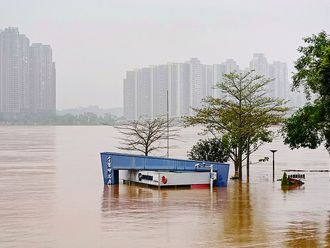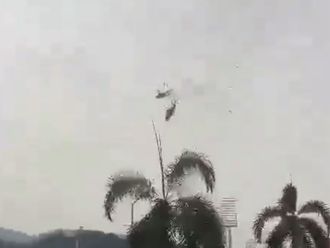Abbottabad: Pakistani intelligence agencies hunting for a top Al Qaida operative raided the house in 2003, according to a senior officer, speaking on condition of anonymity in line with the spy agency's policy.
The house was just being built at the time of the raid by Pakistan's Inter-Services Intelligence agency, and Abu Faraj Al Libi, Al Qaida's No. 3, was not there, said the officer.
US officials have said Al Libi once lived in the house and that information from him played a role in tracking the Al Qaida chief down. Al Libi was arrested by Pakistani police after a shootout in 2005 and he was later handed over to US authorities.
The Pakistani officer said he didn't know why Bin Laden would choose a house that already had been compromised.
Criticism
He also insisted the ISI would have captured Bin Laden if it had known he was there, and pushed back at international criticism of the agency.
The Pakistani government said that since 2009 the ISI has shared information about the compound with the CIA and other Western intelligence agencies, and that intelligence indicating foreigners were in the Abbottabad area continued until mid-April.
'Unauthorised'
Pakistan criticised the American raid that killed Osama Bin Laden as an "unauthorised unilateral action," laying bare the strains the operation has put on an already rocky alliance.
US legislators along with the leaders of Britain and France questioned how the Pakistani government could not have known the Al Qaida leader was living in a garrison town less than a two-hour drive from the capital and had apparently lived there for years.
"I find it hard to believe that the presence of a person or individual such as bin Laden in a large compound in a relatively small town ... could go completely unnoticed," French Foreign Minister Alain Juppe told reporters in Paris.
UK Prime Minister David Cameron
British Prime Minister David Cameron also demanded Tuesday that Pakistani leaders explain how Bin Laden had lived undetected in Abbottabad.
But in a nod to the complexities of dealing with a nuclear-armed, unstable country that is crucial to success in the war in Afghanistan, Cameron said having "a massive row" with Islamabad over the issue would not be in Britain's interest.
White House spokesman Jay Carney told reporters that the US is committed to cooperating with Pakistan.
A day after US commandos killed the Al Qaida leader following a 10-year manhunt, new details emerged Tuesday from Pakistan's powerful intelligence agency and Bin Laden's neighbours in Abbottabad.
Residents said they sensed something was odd about the walled three-story house.
US officials have suggested Pakistani officials may have known where Bin Laden was living and members of Congress have seized on those suspicions to call for the US to consider cutting billions of aid to Pakistan if it turns out to be true.
However, within Pakistan criticism has been focused on the US breaching the country's sovereignty.
A strongly worded Pakistani government statement warned the US not to launch similar operations in the future. It rejected suggestions that officials knew where Bin Laden was.
Still, there were other revelations that pointed to prior knowledge that the compound was linked to Al Qaida.
'Compound raided in 2003'
In an essay published Tuesday by The Washington Post, Pakistani President Asif Ali Zardari denied suggestions his country's security forces may have sheltered Bin Laden, and said their cooperation with the United States helped pinpoint him.
The raid followed months of deteriorating relations between the CIA and Pakistan's intelligence service. Those strains came to a head in late January after a CIA contractor shot and killed two Pakistanis in what Washington said was self-defense.
In a statement, the Pakistani government said "this event of unauthorized unilateral action cannot be taken as a rule."
"The government of Pakistan further affirms that such an event shall not serve as a future precedent for any state, including the U.S.," it said, calling such actions a "threat to international peace and security."












